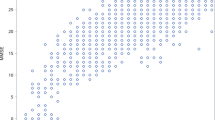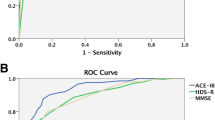Abstract
Introduction
There is an increased prevalence of cognitive impairment (CI) in patients with type 2 diabetes; thus, there is a need for a sensitive and a convenient screening tool for its detection. While Mini-Mental State Examination (MMSE) is a widely used tool for the assessment of cognition, it is not available for free for research. Hindi version of Addenbrooke’s Cognitive Examination III is a freely available cognition assessment tool that has been widely used on diverse group of diseases including diabetes.
Aims and objectives
To assess cognitive function in patients with type 2 diabetes using Hindi version of ACE-III and compare its performance with MMSE.
Materials and methods
Cognition was assessed using validated Hindi version of ACE-III and MMSE among 54 participants with type 2 diabetes and similar number of age, sex, and educational status matched healthy controls. The cut-off for CI was taken at 82/100 for ACE-III, and for MMSE, education level–based cut-offs were used: 21 for the illiterate group, 22 for the low education group, 23 for the middle education group, and 24 for the high education group.
Results
Mean age of the study population was 64.5 ± 5.3 years. The average duration of diabetes was 8.5 ± 6.0 years with mean HbA1C of 8.8 ± 2.5%. Both the tools showed high prevalence of CI among cases, but ACE-III was more sensitive in detection of CI when compared to MMSE (64.8% vs. 55.6%). There was a good agreement between ACE-III and MMSE outcomes (Cohen’s kappa = 0.732).
Conclusion
Type 2 diabetes mellitus is an independent risk factor for cognitive decline in elderly patients. ACE-III is an easy to use, sensitive, and freely available screening tool for cognition assessment in diabetes population.

Similar content being viewed by others
References
Kravitz E, Schmeidler J, Schnaider BM. Type 2 diabetes and cognitive compromise: potential roles of diabetes-related therapies. Endocrinol Metab Clin North Am. 2013;42(3):489–501.
Handley M, Bunn F, Goodman C. Dementia-friendly interventions to improve the care of people living with dementia admitted to hospitals: a realist review. BMJ Open. 2017;7(7):e015257.
Punthakee Z, Miller ME, Launer LJ, Williamson JD, Lazar RM, Cukierman-Yaffee T, et al. Poor cognitive function and risk of severe hypoglycemia in type 2 diabetes: post hoc epidemiologic analysis of the ACCORD trial. Diabetes Care. 2012;35(4):787–93.
Moran C, Phan TG, Chen J, Blizzard L, Beare R, Venn A, et al. Brain atrophy in type 2 diabetes: regional distribution and influence on cognition. Diabetes Care. 2013;36(12):4036–42.
van Elderen SGC, de Roos A, de Craen AJM, Westendorp RGJ, Blauw GJ, Jukema JW, et al. Progression of brain atrophy and cognitive decline in diabetes mellitus: a 3-year follow-up. Neurology. 2010;75(11):997–1002.
Kant S, Poddar K, Kamle M, Patil C. Assessment of cognitive impairment by using Addenbrooke’s Cognitive Examination (ACE) and Montreal Cognitive Assessment (MoCA) amongst type 2 diabetes mellitus patients in Eastern Uttar Pradesh. India IP Indian J Neurosci. 2020;4(4):185–90.
N S, Karan. Assessment of the Cognitive Status in Diabetes Mellitus. J Clin Diagn Res JCDR. 2012;6(10):1658–62.
Solanki RK, Dubey V, Munshi D. Neurocognitive impairment and comorbid depression in patients of diabetes mellitus. Int J Diabetes Dev Ctries. 2009;29(3):133–8.
Lalithambika CV, Arun CS, Saraswathy LA, Bhaskaran R. Cognitive impairment and its association with glycemic control in type 2 diabetes mellitus patients. Indian J Endocrinol Metab. 2019;23(3):353.
Rawlings AM, Sharrett AR, Schneider ALC, Coresh J, Albert M, Couper D, et al. Diabetes in midlife and cognitive change over 20 years: a cohort study. Ann Intern Med. 2014;161(11):785–93.
Launer LJ, Miller ME, Williamson JD, Lazar RM, Gerstein HC, Murray AM, et al. Effects of intensive glucose lowering on brain structure and function in people with type 2 diabetes (ACCORD MIND): a randomised open-label substudy. Lancet Neurol. 2011;10(11):969–77.
Shanmugapriya S, Dhandapani N, Saravanan T. A study comparing cognitive function assessment in type-2 diabetes mellitus using Rowland Universal Dementia Assessment Scale and Mini Mental State Examination. Int J Health Allied Sci. 2018;7(3):184.
Wilson RS, Barnes LL, Krueger KR, Hoganson G, Bienias JL, Bennett DA. Early and late life cognitive activity and cognitive systems in old age. J Int Neuropsychol Soc JINS. 2005;11(4):400–7.
Bruno D, Schurmann VS. Addenbrooke’s cognitive examination III in the diagnosis of dementia: a critical review. Neuropsychiatr Dis Treat. 2019;15:441–7.
Xin J, Xiao X, Chen X, Pan X. Application of Chinese version of ACE-III in type 2 diabetes mellitus patients with mild cognitive impairment. Zhonghua Yi Xue Za Zhi. 2017;97:3455–9.
Bajpai S, Upadhyay A, Sati H, Pandey RM, Chaterjee P, Dey AB. Hindi Version of Addenbrooke’s Cognitive Examination III: Distinguishing Cognitive Impairment Among Older Indians at the Lower Cut-Offs. Clin Interv Aging. 2020;15:329–39.
Kumar K J. 1. Kushwaha, Jitendra Kumar (2016): Beck Depression Inventory: Hindi Translation and Psychometric Properties for the students of Higher Education. Journal of Research in Humanities and Social Sciences (Quest Journals), Vol. 4, No. 9, Pp 39–49. ISSN: 2321–9467 (Online Access). J Res Humanit Soc Sci. 2016; 4:39–49.
Kochhann R, Varela JS, Lisboa CS de M, Chaves MLF. The Mini Mental State Examination: Review of cutoff points adjusted for schooling in a large Southern Brazilian sample. Dement Neuropsychol. 2010;4(1):35–41.
Patel RM, Singh US. Prevalence study of cognitive impairment and its associated sociodemographic variables using mini-mental status examination among elderly population residing in field practice areas of a medical college. Indian J Community Med. 2018 Apr 1;43(2):113.
Goswami A, Reddaiah VP, Kapoor SK, Singh B, Dey AB, Dwivedi SN, et al. Prevalence and determinants of cognitive impairment in rural elderly population in India. Help Age India Res Dev J. 2006;12(1):8–15.
Seshadri M, Mazi-Kotwal N. A copyright-free alternative to the mini-mental state examination is needed. BMJ. 2012;345:e8589.
Nasreddine ZS, Phillips NA, Bédirian V, Charbonneau S, Whitehead V, Collin I, et al. The Montreal Cognitive Assessment, MoCA: a brief screening tool for mild cognitive impairment. J Am Geriatr Soc. 2005;53(4):695–9.
Rowland JT, Basic D, Storey JE, Conforti DA. The Rowland Universal Dementia Assessment Scale (RUDAS) and the Folstein MMSE in a multicultural cohort of elderly persons. Int Psychogeriatr. 2006;18(1):111–20.
Slachevsky A, Villalpando JM, Sarazin M, Hahn-Barma V, Pillon B, Dubois B. Frontal assessment battery and differential diagnosis of frontotemporal dementia and Alzheimer disease. Arch Neurol. 2004;61(7):1104–7.
Giebel CM, Challis D. Sensitivity of the Mini-Mental State Examination, Montreal Cognitive Assessment and the Addenbrooke’s Cognitive Examination III to everyday activity impairments in dementia: an exploratory study. Int J Geriatr Psychiatry. 2017;32(10):1085–93.
Author information
Authors and Affiliations
Corresponding author
Ethics declarations
Conflict of interest
The authors declare no competing interests.
Ethical approval
The study was approved by the Ethics Committee of the institute (EC/09/ethics/2018, dated 21/03/2018).
Additional information
Publisher’s note
Springer Nature remains neutral with regard to jurisdictional claims in published maps and institutional affiliations.
Rights and permissions
About this article
Cite this article
Agarwal, S., Verma, S., Verma, A. et al. Comparison of Mini-Mental State Examination and Addenbrooke’s Cognitive Examination III in detection of cognitive impairment in patients with type 2 diabetes. Int J Diabetes Dev Ctries 42, 538–542 (2022). https://doi.org/10.1007/s13410-021-01012-9
Received:
Accepted:
Published:
Issue Date:
DOI: https://doi.org/10.1007/s13410-021-01012-9




